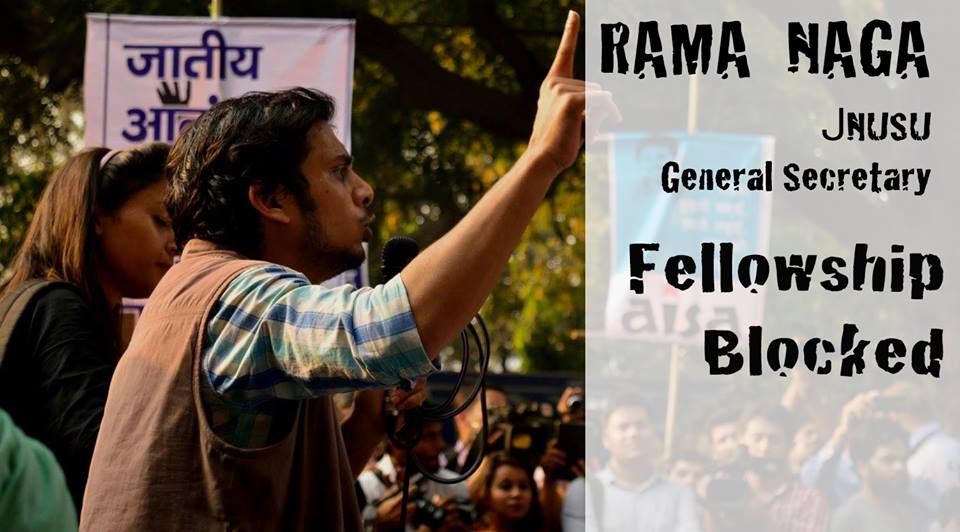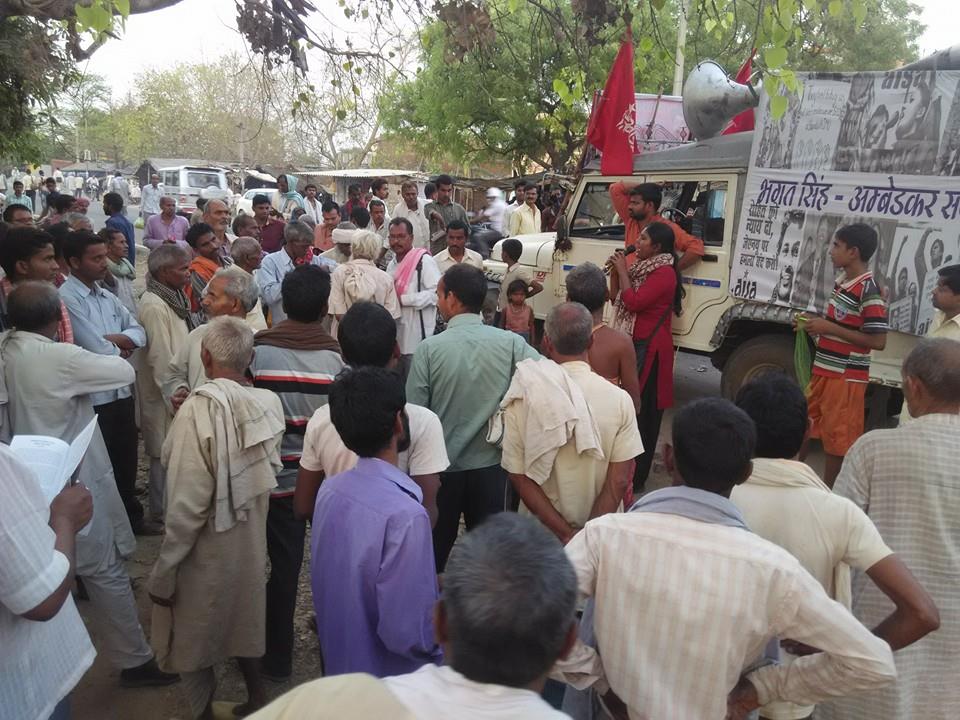
Is there no limit to the pettiness and vindictiveness that University administrations and their masters in the Modi regime’s MHRD (Ministry for Human Resources Development) can display towards young scholars and political activists?
Two days ago, on April 18, Chintu Kumari, an AISA activist and former General Secretary of the JNUSU (Jawaharlal Nehru University Students Union), got a call from the JNU Administration that her MPhil degree and mark sheet had been “blocked” because of her participation in the February 9 event protesting Afzal Guru’s execution. Chintu is among those who received a show-cause notice from the Administration, but was not among the 8 students who had been ‘debarred from academic activities’ for some weeks.
A few days ago, Shweta Raj, JNUSU Convenor of the School of Languages, submitted her fellowship form – to be told by the JNU Finance Branch that it has orders not to clear the fellowships of the ‘debarred’ students.
Soon after, the current JNUSU General Secretary Rama Naga and former JNUSU President Ashutosh Kumar also found that their fellowships are not being cleared by the JNU Finance Branch, even though these students are no longer ‘debarred’.
These students overcome huge social and economic hurdles and handicaps to make it to University, and in Universities like JNU and HCU (Hyderabad Central University), they are able to thrive and emerge as political leaders. It is nothing short of criminal that the Modi Government and its pliant Administrations choose to punish these students for their political activism.
The Government wants us to see these students as one-dimensional ‘anti-nationals’. That’s good enough reason to look a little closer, and see who these students are, and what they get from JNU and what they bring to academics and politics that makes the Government want to end their education and their activism.
Chintu’s father is a whole-time activist of the CPI(ML) in the Bhojpur region of Bihar; her mother sells bangles to sustain the family. Her father has had to live in hiding since 1996, since he is a target for the Ranveer Sena that massacred entire Dalit villages in Bhojpur in the 1990s.
At a recent protest in JNU, Chintu spoke with feeling about the serial killings of CPI(ML) activists in Bihar – in the past month itself, Comrades Mahesh Ram, Rampravesh Ram, and Garo Paswan who had been leading struggles of Dalit villagers for land that is rightfully theirs, were killed in Begusarai by feudal elements.
Chintu was schooled in Delhi in the Kasturba Gandhi Balika Vidyalaya. She did her BA from IP College in DU, and then joined JNU for her MA and MPhil in Political Science. Her brother studies in Bhojpur; to get a sense of the struggles that students like him have had to wage (against mass expulsions and arson attacks) to get an education, do read Javed Iqbal’s piece, ‘JNU, HCU, and Once Upon A Time in Bhojpur.
Between Bhagat Singh martyrdom day on March 23 and Ambedkar Jayanti on 14 April this year, Chintu, Ashutosh, Anant, Rama and other AISA activists have campaigned intensively in villages and towns of India, as part of the ‘Utho Mere Desh’ (Arise My Country) campaign. Chintu spent much of the March-April month in Bhojpur, addressing street corner meetings, and appealing to people to come forward for a new India of Bhagat Singh’s and Ambedkar’s dreams (Naye Bharat Ke Vaste, Bhagat Singh-Ambedkar ke Raste).
Last year, as JNUSU General Secretary, Chintu had visited Bhojpur to meet the young Dalit girls and women who had been gangraped in Kurmuri village by a former Ranveer Sena commander.

Rama Naga, the JNUSU GS, is the first graduate from his village. This is how the Telegraph described him in February, “Naga is a Dalit from Boipariguda in Odisha's Koraput district. His father sells bangles on his bicycle and his mother is a day labourer. …A graduate from Vikram Dev College in Odisha's Jeypore, Naga is shy except when he is on the dance floor. In Jeypore, he gave tuitions to fund his studies….His filmy dances during hostel and varsity cultural events drew crowds on the JNU campus. He's fondly called "Remo" after actor Vikram's character in the 2005 Tamil film Anniyan, which was dubbed in Hindi as Aparichit…. He has earned scholarships ever since he joined JNU.”
His MPhil is a critical study of the movements in his home state against land grab by the Baliapal missile testing range and the POCSO Steel Plant (POCSO has recently admitted defeat and withdrawn plans for the plant). For a young scholar and activist entirely dependent on fellowships, the freezing of his fellowship is a deliberate act of violence. Rama has posted on Facebook about how he, Shweta and Ashutosh are finding it difficult even to pay their mess bills.
Ashutosh is the son of a rail worker in Barh in Bihar. Shweta, from Mughalsarai in UP, in addition to economic hardships, has the usual struggles most young women face, persuading their families to support her choice to pursue a PhD in Hindi literature and Left activism. JNU knows the clear young voices of Ashutosh and Shweta well – from the many struggles in which they have raised slogans and given powerful, inspiring speeches.
The right-wing campaign derides JNU for wasting public subsidies. The likes of Anupam Kher jeer at JNU students asking them why they’re wasting their time doing PhDs instead of earning a living and supporting their poverty-stricken families. BJP MP Chandan Mitra, in a piece urging the Government to jump at any excuse to “shut down JNU” which he dubbed as “a factory that produces only spongers and malcontents.”
Meanwhile, the UGC is slashing funds and fellowships, while the PM himself is seeking to invite foreign universities to set up shop in India.
Students like Rohith or Chintu, Rama, Ashutosh, Shweta and so many others, pose a threat to our rulers, because they refuse to look at education as a commodity; refuse to lose sight of the connections between science, social science, the humanities and society. They refuse to confine their reading and thinking to what can get them marks in exams – they refuse to seal off the classroom from the campus, the street or the slum. ‘Educate’, for them as for Ambedkar, goes hand in hand with ‘organise and agitate’. They know full well that when Bhagat Singh wrote a letter to youth, he didn’t ask them how much they would be earning, he asked them to organise study circles, distribute leaflets, build a revolutionary party, for “for the consummation of our ideal, i.e., social reconstruction on new, i.e., Marxist, basis.” And that’s why they know that Kher, Mitra and Co., would have jeered at Bhagat Singh and his comrades, too, as ‘spongers and malcontents.’ What, after all, is a ‘malcontent’? Neither Bhagat Singh nor Ambedkar preached being ‘content’ with a society ridden with inequality and oppression.
The BJP feels threatened when they see students from rural Bihar, Odisha, Andhra Pradesh, UP express empathy for the people of Kashmir; organise workers on their campuses; and subject the Government to scrutiny. Above all, the BJP feels deeply threatened when young people refuse to accept the RSS attempts to define ‘nationalism’ in terms of Beef or the saffron-waving Bharat Mata baying for blood-and-bullets; and when students instead define patriotism as a concern for citizens’ rights, for justice, for democracy.
Modi came to power boasting of support from the young. Now, wherever he goes, he seems as afraid of the young as the fairy tale Emperor was of the child who saw that he wore no clothes. Today’s students are the most vocal in piercing the balloon of ‘Acche Din’, in saying to him, in the words of Habib Jalib:
“Phool shaakhon pe khilne lagey” tum kaho,
“Jaam rindon ko milne lagey” tum kaho,
“Chaak seenon kay silne lagey” tum kaho,
Iss khule jhooth ko,
Zehn ki loot ko,
Main nahin maanta,
Main nahin jaanta.
“Flowers are budding on branches”, that’s what you say,
“Every cup overflows”, that’s what you say,
“Wounds are healing themselves”, that’s what you say,
These bare-faces lies,
this insult to the intelligence,
I refuse to acknowledge,
I refuse to accept
(Translation courtesy Sana Saleem)
The Government and the University Administrations should have learnt their lesson by now – that every attempt to slap sedition charges, withhold fellowships and block MPhil degrees only adds fuel to a student movement that is growing in determination, and that is a refreshing vent of fresh air for a country suffocated by authoritarianism, betrayed promises and bigotry.
